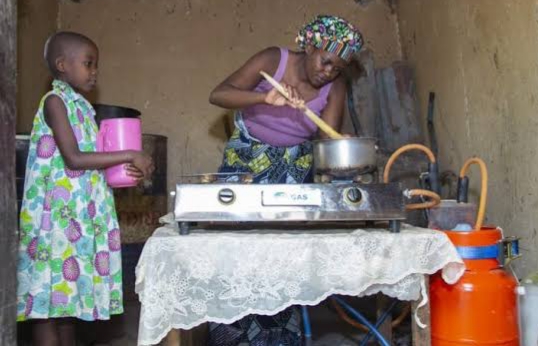Some residents of Lagos State have resorted to change in lifestyle, to help reduce their gas consumption, while awaiting improvements in supply and reduction in the price of cooking gas.
They told the News Agency of Nigeria (NAN) in separate interviews, that using gas had become increasingly challenging as the average price for refilling of a 12.5kg cylinder was N9,000.
They added that when compared to alternative sources, including kerosene and coal stoves, Liquefied Petroleum Gas (LPG), otherwise called cooking gas was easier to manage and kept their environment clean.
Mr Solomon Odewale, an entrepreneur, said that he had taken to using coal pot to reduce his consumption of gas both for home and business use.
He added that he had to get the coal stoves fabricated to reduce the quantity of charcoal used.
“The charcoal sellers have also increased the price of charcoal from N3,250 for a bag to N5,000, because they know that there is an increase in the price of cooking gas.
“I have three coal pots; one for big events, another for medium events and the last one for my personal use at home,” Odewale said.
Mrs Joy Francis, a Housekeeper, said she used a combination of gas, charcoal and firewood, depending on what she was cooking.
“I have a charcoal pot I sometimes use but when I want to cook beans, I use firewood,” she said.
Mrs Oluwafunke Peters, a business woman, said she had placed an order for a kerosine stove in order to minimise her family’s gas consumption.
Peters said the only time the family used hot water for bathing was if there was electricity.
Also, Mrs Rita Chima said her children had recently resorted to bathing with cold water, even when it rained.
Chima added that she had thought of electrical appliances as an alternative but the thought of the impact on her electricity bills made her reject that option.
“While I’m looking for other alternatives, we won’t use the gas anyhow. We will manage our consumption,” she said.
Another resident, Mrs Victoria Ebhohimen said though she still used gas because of the convenience, she had stopped bathing with hot water.
“Now, when I boil water on fire, I have to stay there until the water boils.
She suggested that people who could not afford gas should opt for other alternatives, including charcoal, firewood, boiling rings, electric stoves and kettles.
Ebhohimen, however, added that the electric alternative may be challenging for people who live in areas with irregular power supply.
Mrs Abibatu Evbade, Legal Practitioner, said mothers who had school-aged children, whom they had to prepare lunch for daily were the most affected by the increase in the price of gas.
She added that aside from raising her teenage daughter to use gas, it was a cheaper option which also left her home and cooking utensils neat.
According to Evbade, she plans getting a ‘smokeless stove’ which uses kerosene because using firewood is not an option for her.
“It’s not like kerosene is cheap but I cannot go back to using firewood.
“Though I make stews and soups at weekends to make things easier at weekdays, I still have to prepare lunch and because of that, once I fill my gas before I know it, it’s finished.
“I tried using ring boiler because I normally boil water for my children’s bath but it’s difficult to manage with a teenager.
“All my buckets are half burnt. If not for the mercy of God, it can cause a fire accident,” she said.
Mrs Nkiru Okafor said she had to look for other ways to prevent her gas from running out quickly.
“It’s no longer fresh foods for us. We now cook our foods, like beans in large quantities and store in the freezer. Same goes for soups and stew.
“When we need it, we defrost and warm just to help us save gas,” she said.
Also, Mr Dickson Ohize, an event planner, said that they had reduced everything that they used gas for in his house .
He said the only time they used gas was for making soup and food for the house.
Ohize said he was already thinking of going back to olden days by using coal pot and firewood .
He urged the government to find lasting solution to the hike in price of cooking gas as it remained the best option for cooking.
(NAN)






